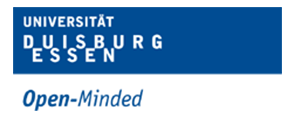University of Duisburg-Essen
 The University of Duisburg-Essen (UDE) is a two-campus university located in the heart of the Ruhr metropolis including 11 faculties. It is one of the youngest universities in Germany founded in 2003 as a merger of the Gerhard Mercator University of Duisburg and the University of Essen. The slogan open-minded stresses a thinking in terms of unlimited possibilities instead of possible limitations. UDE is strong in research and teaching, embraces diversity, promotes academic potential and fights for genuine educational equality. With approximately 41.000 students it is one of the largest universities in Germany and part of the Strategic University Alliance Ruhr cooperating with the universities in Bochum and Dortmund.
The University of Duisburg-Essen (UDE) is a two-campus university located in the heart of the Ruhr metropolis including 11 faculties. It is one of the youngest universities in Germany founded in 2003 as a merger of the Gerhard Mercator University of Duisburg and the University of Essen. The slogan open-minded stresses a thinking in terms of unlimited possibilities instead of possible limitations. UDE is strong in research and teaching, embraces diversity, promotes academic potential and fights for genuine educational equality. With approximately 41.000 students it is one of the largest universities in Germany and part of the Strategic University Alliance Ruhr cooperating with the universities in Bochum and Dortmund.
Empirical research in education is one of UDE’s main research areas. Joint scientific projects with a focus on school-related research in learning and instruction, life cycle learning and learning with digital media are coordinated by the Interdisciplinary Centre for Educational Research (IZfB).
In FaSMEd researchers of the faculty of Mathematics and the faculty of Biology work together with teachers to develop and evaluate new digital classroom materials to support teachers in the use of formative assessment.

Prof. Dr. Bärbel Barzel is professor for Mathematics Education at the Faculty of Mathematics. She is working mainly in the field of secondary mathematics education. She has 10 years of teaching experience in high school and is leader of the nationwide teacher-training-programme T3 (teachers teaching with technology) Germany. Her research foci are the learning with new media, design research on contexts for making sense in mathematics learning and professional development. Current projects besides FaSMEd are ‘Experimental thinking’ – in the postgraduate programme EXMNU, VisDeM, KOSIMA (Contexts for Meaningful Mathematical Learning); CASE-X (Expertise on the use of CAS) and T3 (Teachers Teaching with Technology).

Prof. Dr. Philipp Schmiemann is professor for Biology Education at the Faculty of Biology. After finishing his second state examinations degree in Teaching Biology and Chemistry in Lower and Upper Secondary School, he worked as a scientific researcher at the University of Duisburg-Essen and achieved a PhD in Biology Education. He is involved in initial teacher training and professional development for in-service biology teachers. In the projects ‘Biology in Context’ (BiK) and FaSMEd he is working on teacher CPD including the development and implementation of guidelines and seminars with groups of teachers. He is engaged in national and international projects funded by the German Research Foundation (DFG), European Commission (FP7), Ministries, and private Foundations. His research interests are learning and assessment tasks, models and modelling as well as biological core concepts. He is a member of the Centre for Empirical Educational Research and the ALSTER research group, management board member of the Centre for Teacher Training, and vice-chairman of the Biology Education section (FDdB) of the German Life Sciences Association (VBIO).

Hana Ruchniewicz completed her first State Examinations degree in Teaching Mathematics and Chemistry in Lower and Upper Secondary School at the University of Duisburg-Essen. She is occupied as a scientific researcher for FaSMEd in the scientific group of Prof. Dr. Barzel at the faculty for Mathematics and working on her PhD on students’ self-assessment in the field of functions. Her research foci include the development and evaluation of digital tools for formative self-assessment, common student mistakes in the field of functions and the use of digital technology in learning mathematics.
